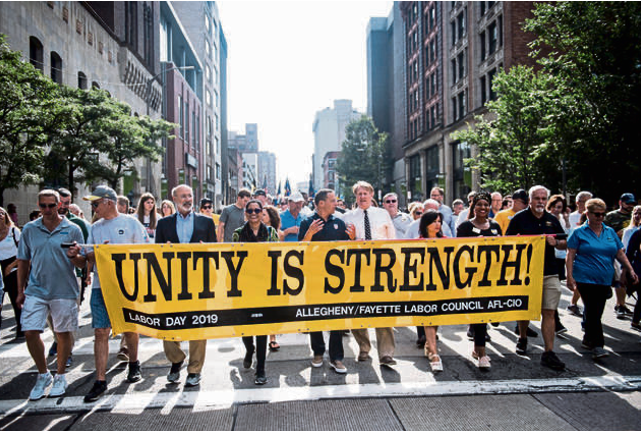CommentsGUEST WORDS--During the COVID-19 pandemic, essential workers have struggled balancing their own personal safety with the demands – often unreasonable, selfish and misguided -- of their deep-pocketed employers.
As hospital ICUs filled up and the death toll from the pandemic mounted around the country, employees at non-union behemoths like Walmart and Amazon found themselves with no bargaining power when it came to the new employment issues of the day: workplace protection from COVID-19 and hazard pay.
Walmart and Amazon, the two largest private employers in the country, have more than enough money for improving safety and providing hazard pay. The Waltons heirs alone are worth over $225 billion, while Jeff Bezos follows closely behind at $196 billion. Amazon's market capitalization is a staggering $1.6 trillion. It recorded profits of $5 billion in just the first three months of the pandemic. Walmart enjoyed higher sales numbers during the pandemic than during same time last year. And it doubled its online commerce sales.
Workers have seen employers grow obscenely wealthier while they worked harder and got sicker.
Sure, there were the token gestures. Amazon gave a $2 per hour hazard bonus, but that ended in June; and Walmart granted bonuses of $300 a month for full-time workers. But that extra $1.88 an hour is hardly enough for being a front-line worker risking infection, not to mention enduring abuse from irate customers, to make billions for their corporate bosses.
Meanwhile, Amazon warehouse employees across the country fell ill and some died from COVID-19 as they accused Amazon of failing to provide safe workplaces. At one facility in Shakopee, MN, the infection rate for Amazon workers was five times that of the surrounding counties. And at another in Hazel Township, PA, more than 100 Amazon workers tested positive for the virus. Workers at Whole Foods, which is owned by Amazon, fared no better. In Washington, DC alone, workers at four out of five Whole Foods tested positive for the virus, while management kept the public in the dark.
The pandemic provided an opportunity for positive change in American capitalism. Amazon and Walmart had the opportunity to take the lead and share the wealth - real wealth, not crumbs - with their workers. They had the opportunity to make strides in protecting their employees through rigorous safety practices, but they didn’t.
With real bargaining power through unionization, Walmart "associates" and Amazon warehouse workers could have forced the companies to do what is right for workers. Without the presence of unions, the companies were left to do as they wished, with virtually no one standing in their way.
Unions give workers a seat at the table. They put power in the hands of employees. And they could have been the difference for millions of Walmart and Amazon workers who risked their lives for inadequate pay during a global pandemic.
This Labor Day let us remember that the unsafe conditions and pay endured by many workers during the pandemic were not caused by a virus. They were man-made. Unions are the change that workers in these companies need. Unions are the check on employers who try to get away with whatever cost-cutting efforts they can.
Workers face a hostile legal environment whenever they try to organize. Labor laws often protect employers who wish to stop organizing drives, and we have a hostile National Labor Relations Board stacked with union-busting members appointed by President Trump.
As consumers, we need to demand that the companies we patronize pay fair wages and provide safe working conditions. But it can only begin by bringing unions into the workplace. And that starts with a new legal environment that secures, rather than inhibits, workers’ rights to organize. Amazon and Walmart will continue to get away with quashing union organizing drives until workers are empowered with meaningful legal protections.
(Cherri Senders is founder and publisher of Labor 411, a Los Angeles-based consumer guide to companies that treat workers fairly.)
-cw















